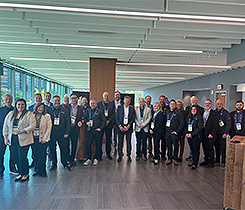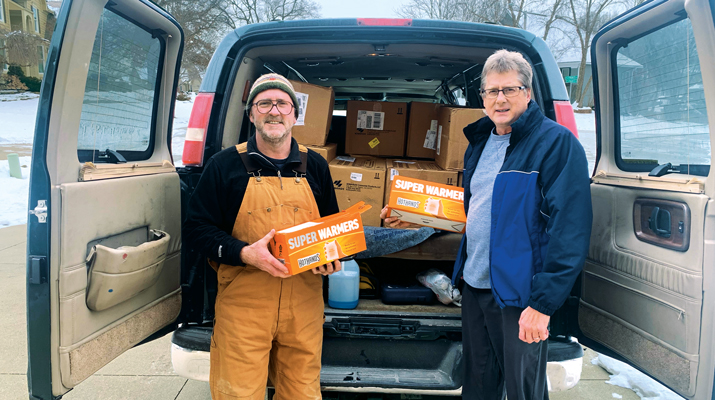Manufacturers, association leaders develop new approach to propane cylinder recycling
A propane cylinder manufacturer’s increased focus on tracking and reacting to industry-impacting legislation across the country is contributing to the development of a new, comprehensive residential recycling program in Connecticut.
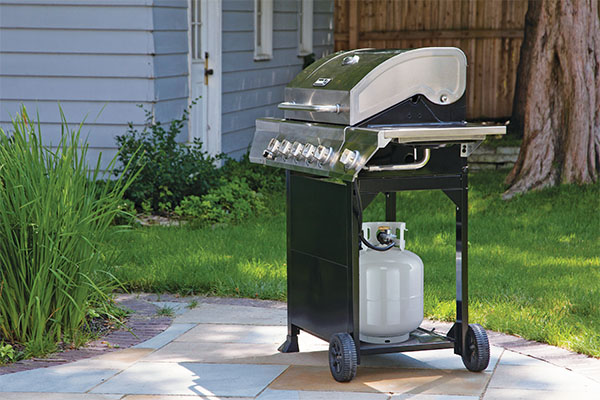
A cylinder provider plans for post-consumer recycling of its products. (Image courtesy of Worthington Industries)
Earlier this year, Connecticut became the first state to enact extended producer responsibility (EPR) legislation targeting gas cylinders.
EPR is a mandatory type of product stewardship that extends a manufacturer’s responsibility for its product to the post-consumer management of that product and its packaging, according to the Product Stewardship Institute. EPR laws have been enacted across the U.S.
In 2021, Worthington Industries became aware of Connecticut’s proposed legislation, introduced to manage and divert gas cylinders, among other products, within the solid waste stream. The Columbus, Ohio-based company felt it could help develop a better solution.
“We found that this legislation was introduced without sufficient engagement with industry stakeholders,” explains Annie Lane, director of product sustainability for Worthington Industries’ consumer products business.
Worthington raised concerns about the legislation, which it says did not reflect best practices learned in other jurisdictions. It wanted to ensure a level playing field for participating companies, change how the state envisioned collection processes and producer roles, and address “unachievable” timelines and other bill language.
“As we became more aware of this,” Lane adds of Connecticut’s legislation, “we saw an opportunity to move from a prescriptive approach, which talked about how this program should be executed and run to one that’s more focused on outcomes, allowing for flexibility for the industry and other waste management stakeholders to put in place a more innovative program.”
Worthington entered the conversation and requested time to understand current practices for collection and management of discarded residential gas cylinders in Connecticut. After a five-month study in 2021 and using lessons learned from established recycling programs in Canada, the company proposed a plan for how the state could best manage its products. The report was met with a positive response.
Working with Worthington and other stakeholders over several months, Connecticut lawmakers designed a new version of the legislation, a substitute for H.B. No. 5142, which the governor signed into law in May. Public Act No. 22-27 paves the way for an industry-led recycling program for certain residential gas cylinders.
Worthington officials say the program is the first of its kind in the U.S. and could serve as a model for other states.
“It’s a big success story for the cylinder industry and especially the propane industry because we’re setting the stage with a flexible approach to managing these products,” Lane says.
Types of cylinders
The Propane Gas Association of New England (PGANE), which works on behalf of six states in the region, was involved with Connecticut’s legislation from the beginning, providing feedback to local stakeholders.
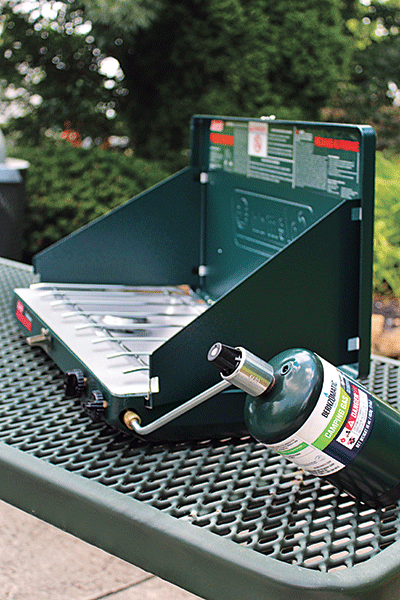
Portable 1-pound containers are among the products included in the recycling program. (Image courtesy of Worthington Industries)
In fact, PGANE had lobbied policymakers to exclude refillable propane cylinders from the product stewardship legislation because of the industry’s current recycling program – through its vast exchange network – for 20-pound cylinders. There are more than 500 exchange sites for refillable propane cylinders across Connecticut, Worthington notes.
To back their claims, PGANE members visited municipalities that reported large quantities of 20-pound barbecue cylinders and discovered that fewer than a half-dozen containers existed at one location, explains Leslie Anderson, president and CEO of PGANE.
“For years, our members have worked to pick up 20-pound cylinders when needed throughout the state,” Anderson says. “What we did find is that there are numerous 1-pound disposable propane containers in need of [proper] disposal.”
The industry must work to address the safe collection of disposable 1-pound cylinders – not just in Connecticut but throughout the U.S., she says.
“These small cylinders have the potential to get into places they should not be put for disposal and can cause less-than-ideal situations.”
The bill in Connecticut includes refillable and nonrefillable cylinders commonly used in camping, grilling, do-it-yourself projects and celebrations requiring portable propane and butane as well as handheld torches and portable helium. These cylinders range in size from a half-pound to 50 pounds.
“They felt quite strongly that the 20-pound propane tank should be included in the legislation,” Lane says of state policymakers.
Because the bill targeted gas cylinders specifically, Worthington saw an opportunity to work directly with local stakeholders on a collaborative approach for, what Lane calls, “this unique category of products.” According to Worthington, industry management of the reclamation process stands to deliver up to $200,000 in state savings annually, in addition to environmental benefits, convenience for consumers and operational efficiency for program participants.
Connecticut state Sen. Craig Miner, a ranking member of the Environment Committee, and state Rep. Joseph Gresko, House chair of the Environment Committee, supported the legislation.
“As a longtime sportsman and outdoor enthusiast, I know the benefit of gas cylinders, but I also know we need a collection and recycling system to ensure proper disposal,” Miner says in a press release.
Gresko says, “This legislation establishes a process for free, convenient and accessible statewide collection, minimizes public sector involvement and enables producers to be innovative in their approach while ensuring safe handling after use and recycling of the products.”
The real work is ahead for producers in implementing the program and helping residents follow best practices, Gresko adds.
Scope of the program
As part of the program, Worthington and other residential gas cylinder producers will coordinate arrangements with qualified companies to pick up, transport and recycle cylinders that are sold at retail locations in Connecticut. The program also includes consumer education about the proper end-of-life management of residential gas cylinders and locations of collection sites.
“The program will involve solutions for residents for collection and recycling of these products,” Lane says. “So today, there are places for consumers to take back these products. Maybe they’re not as well advertised or known, maybe there needs to be additional ones so that they’re more accessible.”
The program will allow for the state to build out locations for the collection of discarded residential gas cylinders at: political subdivisions, transfer stations, material recovery facilities, drop-offs or events, disposal facilities, state parks or private campgrounds, or other entities that are part of an approved gas cylinder stewardship plan.
Companies will collect the cylinders and prepare them for recycling – whether for reuse as a propane container and returned to the exchange system or sent into the scrap metal stream for recovery of the steel.
“There are new commercial opportunities for propane marketers,” Lane says. “Because these are legislative requirements that need to be met, there won’t just be one partner or vendor. There needs to be backup systems in place to make sure the network is robust.”
Asked to elaborate, Lane says there is opportunity for propane marketers to leverage the current infrastructure and activities of the 20-pound exchange network to help with the recycling program for nonrefillable cylinders.
Even with the bill’s passage this year, the program won’t launch until 2025, as the industry works to develop programs and establish transportation and processing infrastructure to support a cylinder collection system.
Consumer education
While the recycling program aims to strengthen the resources that will aid in the proper end-of-life management of residential gas cylinders, more consistent guidance for consumers is another big motivator of the program.
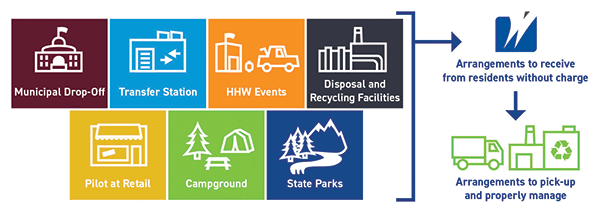
Worthington would work with community partners to collect and recycle propane cylinders. (Image courtesy of Worthington Industries)
Guidance often differs by municipality when it comes to the recycling of many consumer products, creating confusion for consumers, Lane says.
“We plan on leveraging existing communication methods for residents, especially when they’re wondering what to do with their trash,” Lane says. “So, you’ll get your mailers at home with what you can put in the recycling bin, what you can’t, where to take products. We’ll be partnering with local municipalities with those communications that they provide to their residents.”
As a direct response to the new legislation, Anderson is leading a group of cylinder exchange marketers, retailers and wholesalers that will develop a plan and additional outreach to educate consumers about how to properly recycle unwanted cylinders. Manchester Tank and Flame King, along with Worthington, are part of this producer responsibility group.
“Because 20-pounders are unique in that they already have in place an exchange program that addresses nearly all the requirements of the bill, it will be more efficient and less expensive for PGANE to organize and administer this group,” Anderson says.
In addition, Lane says, Worthington will look to collaborate with the Propane Education & Research Council (PERC), which offers guidance on propane tank disposal and recycling. PGANE has been working with PERC as well to develop safety outreach on 20-pound cylinders.
Around the country
Though Connecticut is the first state to introduce extended producer responsibility legislation targeting gas cylinders, industry leaders say other states are moving in the same direction.
Vermont submitted (and later tabled) a similar bill this year, Anderson says, and Worthington is keeping its eye on California, Colorado, Maine and Oregon.
“We see in a number of other states gas cylinders being included in broader packaging legislation, and we feel there’s opportunity to take this model program into those other states and propose that this model be used instead of broader packaging approaches that can be handled through regular curbside processes,” Lane says.
Worthington says it will know the programs are working when initial performance targets – on the number of collection locations and cylinders collected, returned to the exchange system or sent to scrap metal recyclers – are established and assessed after the first year.
In a program design presentation from early this year, the company had suggested a nonrefillable cylinder performance target of 100,000 cylinders collected per year by the fifth year of the program.








